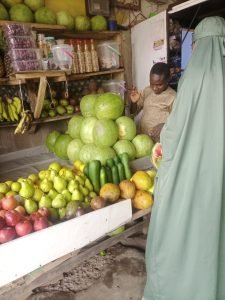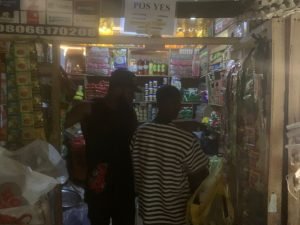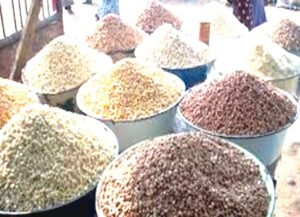Nigerians are still reeling from the effect of high cost of living, which rises with each passing day. The economic effect of this is gloomy as businesses and homes have gone into survival mode, writes Jumoke Olasunkanmi.
Umar Sanni, a trader at Trademore Market, Lugbe, Abuja, is a dealer in fresh fruits. He informs African Health Report (AHR) that his business is not progressing because of reduced patronage due to rising economic hardship. According to him, his shop’s sales have reduced despite the increase in his operating expenses.
“Several of my goods get spoilt as a result of low sales and I have had to throw them away. Regular food items have cost more recently, forcing businesses like ours to take the back seat,” he lamented.

Sanni continued by saying that the rising cost of moving fruits from the farmers has caused a significant rise in the cost of his goods, making it more difficult for people to patronise him.
“All of us have been affected by this fuel matter,’’ he stated, adding, ‘’the price of transporting watermelon and oranges here even from Mararaba has doubled since the removal of fuel subsidy. When we try to reflect the extra cost in our pricing, people just turn back.”

Sanni’s business situation is not peculiar to him. Many small businesses have been struggling to keep their doors open since the removal of fuel subsidy by President Bola Tinubu. Before then, economic decisions by the Buhari government had been suffocating small and medium enterprises in the country.
Abimbola Bello, a shop owner who sells drinks and other petty edibles, echoed Mr. Sanni’s complaints, saying that sales have been at an all-time low and she is no longer able to afford to stock up her store as prices keep soaring.

“When you go to market today, the price you get is not what you will get tomorrow. It makes it hard to even buy goods for sale because money for three items will only buy one now.”
Gloomy economic outlook means no reprieve in the nearest future – Expert
The National Bureau of Statistics reported that the rate of food inflation in May 2023 was 24.83 per cent, which is 5.33 per cent higher than the previous year. According to the survey, price rises in oil and fat, yam and other tubers, bread and cereals, fish, potatoes, meat, fruits, and vegetables were to blame for the rise in food inflation on an annual basis.

Despite Trading Economics’ estimate that food inflation would drop to 23 percent by the end of August 2023, financial expert and stockbroker Olatunde Oluwatuyi says that the forecast now looks unrealistic, given the recent withdrawal of fuel subsidies.

“I do not see the likelihood of food inflation falling, considering the lingering pressure the food basket has been adding to the headline inflation month on month. As much as the pointers to food inflation such as rural insecurity, high demand and short supply shock, delayed government intervention still exist, food inflation will continue to rise.”
Households adopt survival tactics, spend scarce resources on only core necessities
The gloomy economic statistics imply that to deal with food inflation, the typical Nigerian must make compromises regarding the quality and quantity of food products and home goods. In place of staples like meat, chicken, and fish, eggs are now largely used.
Mrs. Ada Joseph, a mother of two, who requested that her picture should not be taken, explained to AHR that with the rising cost of food, she has had to make changes in her home cooking.

“I stopped buying sardine when it became N500. I fry my children’s egg plain now. Ribena is N250 and Caprisun is N150, there is no N50 biscuit so even the snacks they take to school has reduced,” she explained.
The impact is even worse on Nigerians on the very low pay level. From living from hand to mouth, they now have to look for ways to further reduce their cost of living.
Commercial motorcyclist Muhammed is one of such people. He told our correspondent that despite buying fuel at an exorbitant price, he has to pay twice more for food at his usual joint.
“Before now, I could buy a proper meal with meat for N300 but now they don’t sell less than N500 and it is so small that I will have to ask for extra. Living in this country is now very hard and the government needs to do something to help us,” he said.
Food sufficiency, price control as the way forward
When asked ways to mitigate the consequences of the skyrocketing inflation rate, Mr. Oluwatuyi said that it was the responsibility of the government to offer assistance to the populace through intervention programmes and price control regulations.
“Ensuring food sufficiency is the way forward. The government needs to pay attention to improving supply by addressing the issue of insecurity faced by farmers.The government also needs to look at price control – we have seen traders fixing prices and inflating their profit margin to serve as a buffer for what might come, even if it does not come eventually. I believe government’s intervention in price arbitrage will moderate inflation spike,” he added.


